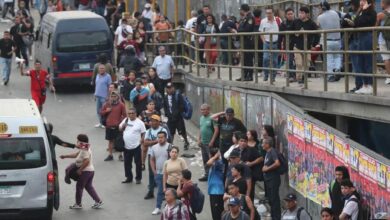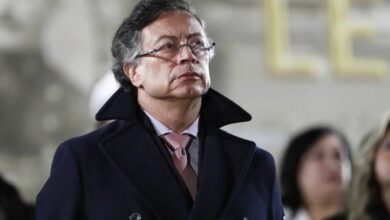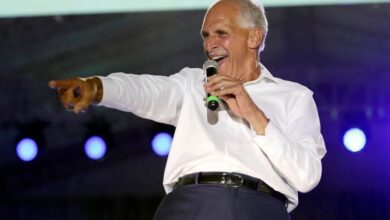Peru Elections 2021: What will happen in the first round?
In the midst of the health contingency of COVID-19 and an increasingly powerful political instability, Peru is preparing to go to the polls to vote.

The dispute is led by Yonhy Lescano, but apathy and abstentionism have historical rates in this country. Photo: TW-yonhy_lescano
LatinAmerican Post | Jorge Francisco Vuelvas Lomeli
Listen to this article
Leer en español: Peru Elections 2021: What will happen in the first round?
On April 11, Peru will elect its new president. The dispute is led by Yonhy Lescano, but apathy and abstentionism have historical rates in this country.
Centroderechista Lescano sube y lidera preferencias para presidenciales en Perú #AFP https://t.co/YaxqyAIaK8 pic.twitter.com/xtcaEFHC8A
— Agence France-Presse (@AFPespanol) March 14, 2021
Who is and what does this character propose that will undoubtedly reach a second round? Why do you see an apathetic environment in a country where voting is mandatory? How are the surveys going?
Yonhy Lescano: a conservative populist.
Yonhy Lescano, has become the favorite in the polls heading into the first round of April 11. It is very likely that he will face a runoff in June.
He is the favorite in the southern region of Peru, a region that tends to tilt its vote to the political left, although the prevalence of older people means that there are more conservative ideas regarding government decisions.
Some of its policies are aimed at lowering the prices of services for people with the highest income needs and the middle class in the country; sectors that have been greatly affected due to the prevalence of the coronavirus in the country.
In an interview conducted by Reuters, the candidate leading this presidential race stated that he hopes to reduce the cost of natural gas by increasing competition and allowing imports of this hydrocarbon, which represents almost half of the country's energy supply. He said that he will support the construction of a gas pipeline between Bolivia and Peru.
Lescano also promises to improve credit channels by forcing private banks to lower interest rates and may seek to encourage Banco de la Nación to enter the market and compete with private lenders.
Also read: How important is Lula's return to Brazilian politics?
She also has a conservative attitude toward certain social issues, including opposition to abortion, same-sex marriage, and education about gender identity at school.
However, despite the fact that throughout the campaign he has been accused of being a consolidated conservative, he himself is classified as a “popular shareholder”, as he claims to harbor diverse points of view and tendencies from the entire Peruvian nation.
Democratic apathy
Despite the fact that Lescano leads the polls to go to the second round, there is one element that is winning enormously: democratic apathy. The Institute of Peruvian Studies recently published a survey where people undecided about their vote were positioned at 31%.
It is the first time in the history of the country in which such a high indifference is displayed, and this is caused by the health and economic crisis that is being experienced in the country, as well as the corruption scandals around the vaccine against COVID- 19 that were unleashed in previous months.
Salaverry, candidato a la presidencia mostró su verdadera cara al ser increpado por un ciudadano venezolano.
Hace unas semanas el candidato, indicó que sacaría a los venezolanos del Perú. #SinAsiloSinResidencia – vía @OliverLopezCano pic.twitter.com/reFIivkfI9
— Sin Asilo Sin Residencia (@DenegadosRH) March 12, 2021
According to the study Institutional Trust in Latin America by Fundación Carolina, Peru is the country that trusts the institutions of its country the least, with the Peruvian Congress being the most punished, since seven out of ten Peruvians do not trust its legislative power.
How are the surveys going?
In the latest survey published by the Peruvian Company for Market Studies and Public Opinion (CPI), the three best-evaluated candidates were: Yonhy Lescano, with 12.2% of the intention to vote; George Forsyth follows, with 8%; Rafael López Aliaga remaining in third place, with 7.2%.
The famous Keiko Fujimori, daughter of the former president and classified as a Peruvian dictator, ranks fourth with 6.5%.
Although Lescano almost certainly has his place in the second round, it will be interesting the trend changes between Forsyth and Aliaga will define if the final contest against Lescano will be with a former footballer who openly supports the private sector and has a centrist political ideology (Forsyth); Or, on the contrary, there will be a contest with an accepted conservative who constantly accuses of the danger that Peru will become a new Venezuela (Aliaga).
But since nothing is ever certain in the electoral arena, perhaps Keiko Fujimori will be seen again in the second round, keeping alive the spirit of a political current in Peru that constantly yearns for a return to the heavy-handed politics that was had in against the then Shining Path; Only this time, it could be against organized crime (one of the evils that most affects ordinary Peruvians).
@KeikoFujimori trabajando en su campaña, desde muy temprano … … #FuerzaKeiko pic.twitter.com/IogCaABqsB
— jorgesomontes6901@gmail.com (@jorgesomontes61) March 17, 2021
The cards are on the table, and only two players will go to the final, but undoubtedly, this will not be the year of progressivism in Peru, since all the leaders are betting on policies that go against the trends of gender identity and the right to decide on motherhood.




